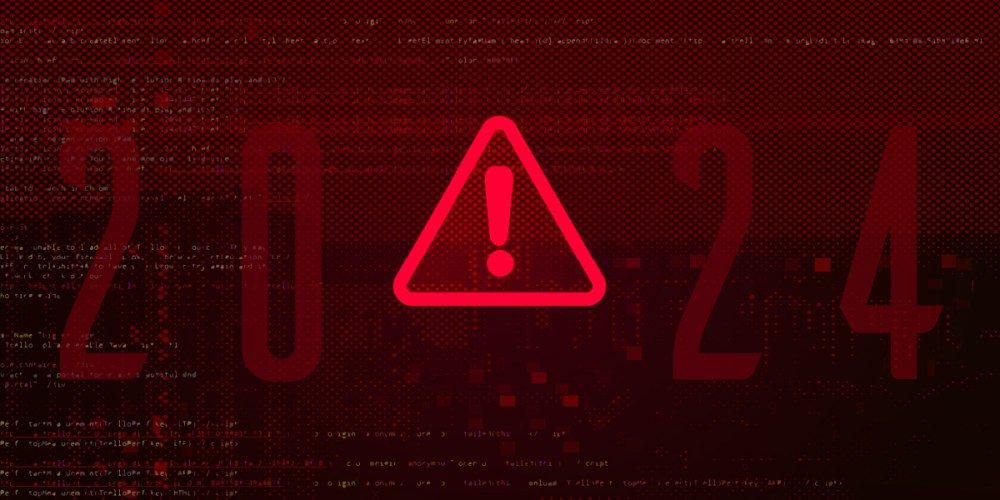Even-numbered years get all the action. Big US elections, the Olympics, major soccer tournaments—they all happen in years that can’t end in a prime number. Unfortunately, with big events come big security risks, including cybersecurity threats. According to expert observations, 2024 is shaping up to be a banner year for cyberthieves.
Some existing threats are growing. Ransomware, for instance, which had plateaued a bit in recent years, came roaring back in 2023. The Department of Homeland Security (DHS) predicts that ransomware attackers will have their second-best year ever in 2023. In the first half of 2023 alone, ransomware perpetrators stole nearly $450 million.
Experts expect the cost to victims of ransomware to skyrocket from $20 billion in 2021 to $42 billion in 2024, to an astonishing $265 billion by 2031. And it’s not just big organizations that will bear the brunt. Cyberattackers target smaller businesses with more than half of their attacks. There’s little wonder as to why, given that 99.9% of American businesses are small or medium-sized businesses (SMBs). Often underprepared, SMBs are ripe for cyberattacks.
3 cybersecurity threats with a 2024 vintage
Ransomware will remain a major, but hardly the only, threat to small businesses in 2024. All sorts of attacks could bear the stamp of a year that seems set to deliver drama, controversy and conflict. Global events are likely to dictate the nature of perhaps even the pace of attacks. Consider that 2024 is likely to deliver the following:
No. 1: Continued conflict in Ukraine and the Middle East
The human cost of conflict is, of course, what matters most in situations such as the war in Ukraine and tensions in Israel and Gaza. But there are potential cybersecurity threats that arise from those situations as well.
Perhaps the most likely threat for your business or firm to beware of falls into the ransomware category. Would-be cybercriminals will send credible-looking emails with fake news updates or solicitations to donate to fraudulent charitable causes. With tensions running high around the world regarding high-profile conflicts, it’s possible that your employees could fall victim to ransomware in a moment of panic or emotional distress. Employees should always go directly to known and rated charity websites if they wish to donate. They should never click on a link or respond to a text or email.
But there’s more to attacks surrounding global events than just a ransomware threat. The DHS warns that cyberattackers representing multiple international interests—primarily Russia, China and Iran—will continue committing denial-of-service and espionage attacks in the US. This might sound like a threat that only applies to big organizations, but that’s not the case.
If you, a customer or a client are involved in any way with industries such as defense, energy, nuclear, aviation, transportation, healthcare, education, media or telecommunications, your business or firm could be a target. That’s a very wide net, and cyberattackers aren’t known for being discriminating in their choice of targets. If you look like an adversary, you’re on the potential hit list.
No. 2: Election interference
With a pivotal presidential race and a long and bitter campaign on the agenda for 2024, cyberattackers will once again attempt to disrupt the US elections. Election interference is nothing new, but it will ramp up significantly in a major election year. While many attacks will target actual voting infrastructure rather than businesses, your organization could still be at risk.
Elections bring out not only strong emotions that can cloud judgment, but also the significant threat of ransomware. There will likely be a flood of emails that arrive in your team’s inboxes, asking for campaign donations, promising election updates—and some will bear malicious code that installs malware in your network if you and your employees fall for it. Remember, it only takes one click.
But again, there’s more to this threat than just the ransomware element. If you have clients or customers who have, for instance, donated to a political campaign—or if you’ve done so yourself—you all could be targets for a malicious spying or denial-of-service attack. Some of those attacks will come from radical elements inside the US, while the usual international suspects will likely perpetrate others.
No. 3: Major sporting events
The summer of 2024 will be a blockbuster for sports. The Summer Olympics will take place in Paris in July and August, immediately preceded by the Euro 2024 soccer tournament in Germany. While soccer might not be the phenomenon in the US that it is in Europe, the Euro will nevertheless have a lot of American fans riveted to their screens.
There’s little doubt that someone in your organization will want to watch the action. With Paris and Germany both six hours ahead of the US East Coast, there will be plenty of viewing opportunities stateside during work hours. Legitimate streaming services will carry every major event. You can work out with your employees (or even yourself) how much they’ll be able to watch at work.
But beware of the “free” websites that proclaim to offer free streams of games and other events. Some really do offer free viewing, but it comes at a cost nonetheless—illegitimate streaming sites are notorious carriers of malware. Some sites can install malware as soon as a user loads them—no clicks necessary. Just clicking on a link in Google, then, can be enough to launch a data breach for a cyberattacker. You need to make sure your employees stay far away from these tempting sites.
Big sporting events, of course, always come with lots of timely updates via multiple formats, so the ransomware threat is again elevated. If your employees are big soccer or Olympics fans, banning them from watching events at all might be ineffective. But restricting how they watch and educating them on cyberthreats is an absolute necessity.

How to rein in cybersecurity threats in 2024
The year ahead in cybersecurity promises to be tumultuous. And it will only get worse: Cybersecurity professionals have become almost impossible to find. If you’re looking to hire IT expertise in-house, you’ll pay a premium…if you can find anyone at all.
A better way is to let a partner handle security for you. As you tackle 2024, you can trust Rightworks to deliver managed security services that can protect you from ransomware and other looming threats on all of your workstations. Total Security provides the protection you need at a fixed monthly cost that can scale as your business grows. A managed security provider can:
- Provide a secure email service that protects your inbox from malicious messages.
- Implement and maintain essential technologies such as multifactor authentication (MFA), a virtual private network (VPN) and protection for your devices.
- Update applications without having any impact on your daily business activity.
- Back up and protect your data offsite for maximum availability.
- Protect your data in enterprise-class facilities and provide 24/7/365 support.
Plus, Rightworks can educate your employees on how to avoid cyberthreats—the very first thing the Federal Communications Commission (FCC) recommends businesses do when implementing a cybersecurity plan. Educated employees are your best line of defense against cyberthreats.
With 2024 set to be turbulent, you need to be sure the cybersecurity resources you have in place will protect your firm or business. Don’t go it alone in what promises to be a challenging year. Rightworks can get you where you need to be in the new year.
Make sure your data is protected in 2024. Get started now.


